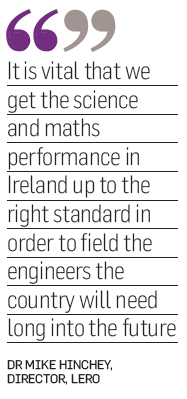Dr Mike Hinchey, director, Lero
At the end of January, Science Foundation Ireland (SFI) and a consortium of top technology companies, including Intel and IBM, revealed plans to invest €22.4m over the next five years in University of Limerick-based software engineering research centre Lero.
Lero is Ireland’s national software engineering research centre and in less than a decade has grown to co-ordinate many of the software engineering research activities of Ireland’s six universities.
Its progress in recent years has been driven by the vision and hard work of former NASA scientist Dr Mike Hinchey.
A graduate of UL, Hinchey was awarded the President’s Gold Medal as leading student in his graduating year. He was also awarded an MSc in computation at the University of Oxford and a PhD in computer science at the University of Cambridge.
“My dad was an engineer and that’s probably where it came from. I got access to my first computer in the late 1970s and at nine years of age I was coding in Basic.”
Dr Mike Hinchey’s work at NASA
Hinchey’s work with NASA was implemented in various space projects and will be incorporated in future missions. He helped make NASA missions self-managing and able to proceed to terrains which were previously inaccessible. He also helped develop significant advances in survivability, with consequent less likelihood of mission failure.
According to Hinchey, his arrival at NASA was almost accidental. During a visit there in 1995, he was made aware of a programme that was interested in taking non-civil servants aboard. The competition was stiff, with Nobel prize winners taking part.
Hinchey’s acceptance, he explains, was down to the work he had done in the area of self-managing software.
“The idea was that we would take ideas from nature and biology and apply that to engineering.”
His work was so useful to NASA in terms of existing and future space missions – including landing swarms of robots on Mars at some future stage – that after four years, because he wasn’t a civil servant in the US, it required a vote in Congress to extend his contract.
During his time with NASA, he rose to the position of director of NASA’s software engineering lab.

Hinchey returned to Ireland in 2008 to take up the role of director of Lero and he sees his job as vital in helping three worlds collide – ICT in our schools, ICT in small businesses and ICT to support the R&D efforts of multinationals based in Ireland.
As one of SFI’s Centres of Science, Engineering and Technology (CSETs), Lero has a team of 170 researchers and PhD students working on software applications such as urban traffic control, corporate compliance systems, medical devices, financial services, ICT, mobile communications and space missions.
Since its foundation, Lero has forged research partnerships with more than 70 multinationals and indigenous companies, including organisations like the European Space Agency and United Technologies Research Centre in Cork.
The recent €22.4m investment comprises €16m from SFI in second-term funding and an industry contribution of €6.4m.
The companies contributing to the industry investment include IBM, Intel, Information Mosaic, JBA Consulting, QAD Ireland, Kugler Maag CIE, Almir Business, Movidius, Lumension Security, Vitalograph, StormTechnology and Fineos.
Major research projects for Lero
Lero has been successful in winning major research projects, such as a €300,000 deal with the European Space Agency and a €670,000 research project under the EU’s FastFix project as part of Framework 7.
“Our plan was always to be a national resource for the country and we’ve been more successful than anyone predicted.”
However, Hinchey says the key now is to make sure that as a national resource Lero is open to small businesses to develop products and services that will grow the economy. Another aim is to spin-out research projects as start-ups in their own right.
A further core aim is to help boost the quality of software engineering talent in Ireland. This, Hinchey says, begins in secondary schools and last September Lero began a programme to upskill 50 secondary teachers to teach software engineering.
“It is vital that we get the science and maths performance in Ireland up to the right standard in order to field the engineers the country will need long into the future. The only way is to keep increasing the performance of students and the performance of our research.”
This, he notes, will help to not only attract more industry into Ireland, but will spawn new industries for Ireland.
“Look at the work we are doing with the European Space Agency, this is the first time Ireland has attracted software investment from the ESA, for example.
“With start-ups, we’ve had two spin-outs and a number of individuals are setting up their own companies. We are planning for many more spin-outs in the future as Ireland’s reputation for quality software engineering rises,” Hinchey adds.